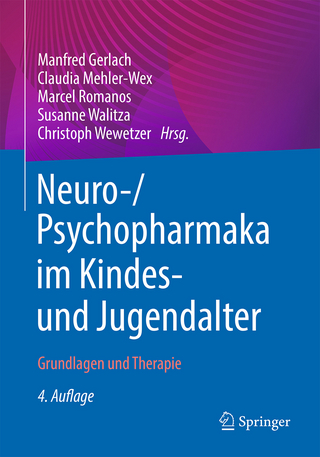
Molecular Neuropharmacology: A Foundation for Clinical Neuroscience, Third Edition
McGraw-Hill Professional (Verlag)
978-0-07-182769-0 (ISBN)
- Titel ist leider vergriffen;
keine Neuauflage - Artikel merken
Publisher's Note: Products purchased from Third Party sellers are not guaranteed by the publisher for quality, authenticity, or access to any online entitlements included with the product.
GAIN A COMPLETE UNDERSTANDING OF NERVOUS SYSTEM FUNCTION AND ITS RELATIONSHIP TO HUMAN NEUROLOGIC DISORDERSMolecular Neuropharmacology first reviews the fundamental biochemistry of the functioning nervous system and then describes how nerve cells communicate with one another through numerous types of neurotransmitters involving amino acids, monoamines, neuropeptides, and neurotrophic factors, among several others.
The neuropharmacology and neural circuits that underlie complex behaviors as well as major neural disorders are also discussed as are the drugs used to treat those conditions. In the final section, the authors use the concepts presented in the first two sections to explainhow irregularities in the biochemistry of neuronal interactions can lead to a wide array of clinical manifestations.
FEATURES
NEW chapter on neuroinflammation
All chemical structure illustrations have been redrawn and improved
Fully updated to reflect the latest breakthroughs and new drugs
The most well-written and easily understood work on the subject
More than 300 full-color illustrations!
Eric J. Nestler, MD is Professor and Chairman of the Department of Psychiatry and the Center for Basic Neuroscience at the Southwestern Medical School, Graduate School of Biomedical Sciences, Dallas Texas. He is also the Lou and Ellen McGinley Distinguished Chair in Psychiatric Research. The goal of Dr. Nestler's research is to better understand the ways in which the brain responds to repeated perturbations under normal and pathological conditions. A major focus of the research is drug addiction: to identify molecular changes that drugs of abuse produce in the brain to cause addiction, and to characterize the genetic and environmental factors that determine individual differences in the ability of the drugs to produce these changes. A related interest is to understand the contribution of the brain's reward regions to the regulation of normal mood as well as the abnormalities in mood and motivation seen in depression. Dr. Nestler has authored or edited 5 books, and has authored or co-authored 180 original research articles and 90 review articles and book chapters. He currently mentors seven post-doctoral fellows and six graduate students. He has trained 27 post-doctoral researchers, eight research track residents, and ten graduate students. Dr. Nestler is the recipient of numerous awards and honors, including the Pfizer Scholars Award (1987), Sloan Research Fellowship (1987), McKnight Scholar Award (1989), Efron Award of the American College of Neuropsychopharmacology (1994), and Pasarow Foundation Award for Neuropsychiatric Research (1998). He has served on the Board of Scientific Counselors of the National Institute on Drug Abuse, and currently serves on the Scientific Advisory Boards of the National Alliance for Research in Schizophrenia and Depression and of the National Alliance for Autism Research. Dr. Nestler is also a member of the National Advisory Mental Health Council, the Council of the Society for Neuroscience, and the Council of the American College of Neuropsychopharmacology Steven E. Hyman, MD is Provost of Harvard University and Professor of Neurobiology at Harvard Medical School, Boston, MA. From 1996 to 2001, he served as Director of the National Institute of Mental Health (NIMH), the component of the US National Institutes of Health charged with generating the knowledge needed to understand and treat mental illness. Before serving as Director of NIMH, Dr. Hyman was Professor of Psychiatry at Harvard Medical School, Director of Psychiatry Research at Massachusetts General Hospital , and the first faculty Director of Harvard University's Mind, Brain, and Behavior Initiative. In the laboratory he studied the molecular biology of neurotransmitter action. Dr. Hyman is a member of the Institute of Medicine of the National Academy of Sciences and of the American Academy of Arts and Sciences. He is currently serves as Editor of the Annual Review of Neuroscience. He received his BA from Yale College in 1974 summa cum laude, and his MA from the University of Cambridge in 1976, which he attended as a Mellon fellow studying the history and philosophy of science. He earned his MD from Harvard Medical School in 1980. Robert C. Malenka, MD, PhD is Pritzker Professor of Psychiatry & Behavioral Sciences at Stanford University, Palo Alto, CA. He is a fellow of the American Academy of Arts and Sciences, a member of the Institute of Medicine of the National Academies and an Associate of the Neurosciences Research Program. He has won several awards including the International Prize in Neuroscience, the Distinguished Alumni Award from Stanford University and the Daniel Efron Award from the American College of Neuropsychopharmacology. A major goal of his laboratory is to elucidate both the specific molecular events that are responsible for the triggering of these various forms of synaptic plasticity and the exact modifications in synaptic proteins that are responsible for the observed, long-lasting changes in synaptic efficacy.
1. Fundamentals of Neuropharmacology1. Basic Principles of Neuropharmacology2. Cellular Basis of Communication3. Synaptic Transmission4. Signal Transcuction in the Brain2. Neural Substrates of Drug Action5. Excitatory and Inhibitory Amino Acids6. Monoamines, Acetylcholine, and Orexin7. Neuropeptides8. Atypical NeurotransmittersNeuropharmacology of Neural Systems and Disorders9. Autonomic Nervous System10. Neural and Neuroendocrine Control of Internal Mileau11. Pain 12. Neuroinflammation13. Sleep and Arousal14. Cognitive Function and Behavior15. Mood and Emotion16. Reinforcement and Addiction17. Schizophrenia and Other Psychoses18. Neurodegeneration19. Seizures20. Stroke and Migraine
| Erscheint lt. Verlag | 16.2.2015 |
|---|---|
| Zusatzinfo | 224 Illustrations, unspecified |
| Sprache | englisch |
| Maße | 180 x 254 mm |
| Gewicht | 819 g |
| Themenwelt | Medizin / Pharmazie ► Medizinische Fachgebiete ► Neurologie |
| Medizin / Pharmazie ► Medizinische Fachgebiete ► Pharmakologie / Pharmakotherapie | |
| Naturwissenschaften ► Biologie ► Zoologie | |
| ISBN-10 | 0-07-182769-2 / 0071827692 |
| ISBN-13 | 978-0-07-182769-0 / 9780071827690 |
| Zustand | Neuware |
| Haben Sie eine Frage zum Produkt? |
aus dem Bereich


